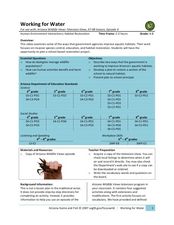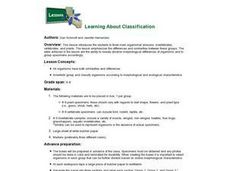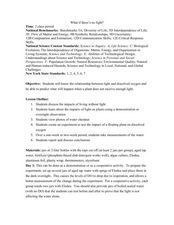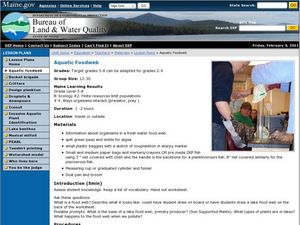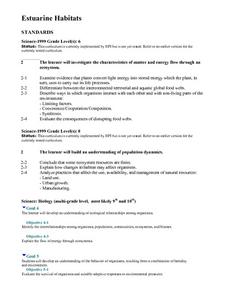Curated OER
Plant And Animal Adaptations
Young scholars examine plant and animal life while looking at the environments the organismisms live in. They determine how form follows function by looking an aquatic turtle and noticing its feature of adaptation features. They work in...
Alabama Learning Exchange
Biomes
Pupils research different biomes and find its climate and what plants and animals that can be found in them. For this biomes lesson students search the Internet for their information and fill out a biome chart.
Curated OER
Personal Ecosystem
Young scholars build an aquatic ecosystem using large glass pickle jars. In this ecology lesson, students build and ecosystem then observe and collect data on the habitats. In this long term project young scholars observe a population...
Curated OER
Working for Water
Young scholars examine the ways that government works to help improve aquatic habitats. In this water habitats lesson students view a video and plan a school restoration project.
Curated OER
Biocomplexity Lab Activity: Measuring Turbidity
Students measure turbidity and comprehend the effects of turbidity on aquatic life. They explain what a lake looks like after a heavy rainfall. Students comprehend that turbidity is a measure of the relative clarity of water.
Curated OER
Learning About Classification
Middle schoolers explore the three main organismal divisions. Students classify organisms by invertebrates, vertebrates, and plants. They observe the differences and similarities between these groups.
Curated OER
Weave an Aquatic Food Web
Young scholars explore organisms that are part of interconnected food webs. In this food web lesson, students choose an animal and research what the animal eats. Young scholars begin with the food chain and branch out into the...
Curated OER
Marine & Aquatic Habitats Activities - Terrestrial Forests vs. Kelp Forests
Students discuss concept and specificity of habitats, both marine and terrestrial, list similarities and differences in the habitats of a kelp forest and a terrestrial forest, compare types of organisms that occupy corresponding types of...
Curated OER
Forest In A Jar
Students conduct an experiment using soil, water, seeds, a plant, and a jar; and then draw a poster to represent their observations and findings. They make a poster showing what happened to their aquatic environment.
Curated OER
What If There's No Light?
students discuss the importance of light and the consequences of living without it. Using a plant as a demonstration, students predict and observe what happens to a plant when it does not receive enough light. In groups, they experiment...
Curated OER
SAV Plants of the St. Mary¿¿¿s River Ecosystem
Students examine the importance of submerged aquatic vegetation in the St. Mary River ecosystem. They identify different characteristics of common eelgrass and discuss water quality, photosynthesis, habitat, oxygen production.
Curated OER
Aquatic Communities
Students watch a video about aquatic communities. They conduct an experiment that shows how movement of rivers change the landscape. They compare fresh and salt water communities and its wildlife.
Curated OER
Exploring Limu Diversity
Students explore limu diversity. In this ocean ecosystem lesson, students classify limu according to its physical properties. Students work in small groups to generate scientific observations and sort limu by characteristics.
Curated OER
World of the Pond
Field trip! The class will review what they know about organisms that dwell in freshwater ponds, then trek down to the old water hole to collect specimens for examination. This includes several web links, useful tips, and an excellent...
Curated OER
Dream Stream
Investigate the parts of a healthy stream to build content-specific vocabulary and ecological awareness. The class builds vocabulary and determines why clean water is important for trout. They design a shoe box to show what a clean...
Baylor College
Bio Build-up
Trace pollutants through the environment in the seventh lesson of this series on the science of food. Looking at a picture of the plants and animals in an aquatic ecosystem, learners use dot stickers to represent harmful chemicals as...
Curated OER
Photosynthesis and Respiration
Students comprehend the relationship between plants and animals in an aquatic ecosystem. They predict the effects of low dissolved oxygen on the organisms. Students create microcosms with plants, animals, or both. They determine which...
Curated OER
Oceans in Motion
This simple activity introduces children to basic marine life as well as to show them the necessity of protecting aquatic environments. Some famous marine life animals are introduced via vocabulary words, then children cut out pictures...
Curated OER
Water Quality and Temperature
Students are led through three activities to explore the effect of temperature fluctuations on the growth and survival of aquatic plants, clams, and shrimp eggs.
Curated OER
Water Quality And pH
Learners determine the pH level of water and its effect on aquatic plants and brine shrimp eggs. This is a three part activity that leads the student through the development of an understanding of water pH. They form a hypothesis and are...
Curated OER
Aquatic Foodweb
Learners explore what a food web is. In this science instructional activity, students examine how nutrients and other pollutants enter a lake and play a food web game whereby learners pretend they are either zooplankton, planktivore,...
Virginia Department of Education
Changes in Ecosystems
How does water pollution affect the environment? Provide your class with the resources to answer this question as they learn about eutrophication and ecosystem changes. Over two weeks, they simulate the effects of pollution on the...
Curated OER
The Wonderful World of Slugs
Examine a slug? Of course, what else would a 2nd grader do with it? Pupils use clues and go on a slug hunt, read a slug story, or make a cooperative group mural of a slug's habitat. While older learners catalog slugs, go on a slug hunt,...
Curated OER
Estuarine Habitats
Sixth graders study the important habitats, flora, fauna, and physical factors of coastal habitats. They compare the aquatic habitats to terrestrial habitats by researching and completing tables with the information.
Other popular searches
- Aquatic Plants and Animals
- History of Aquatic Plants
- Aquatic Plants and Ph
- Aquatic Plants and Animals.
- Btb and Aquatic Plants
- Tb and Aquatic Plants
- Aquatic Plants (Science)
- Aquatic Plants Science
- How Plants Grow Aquatic





